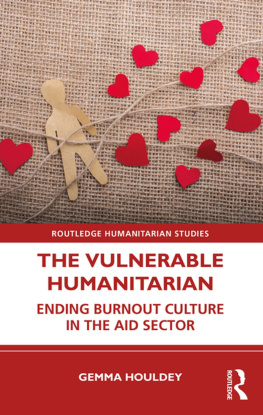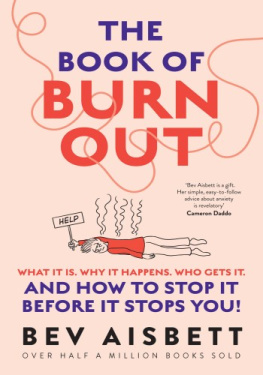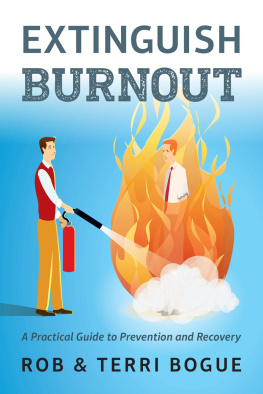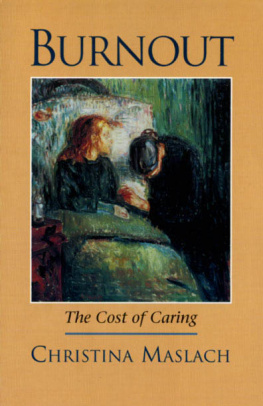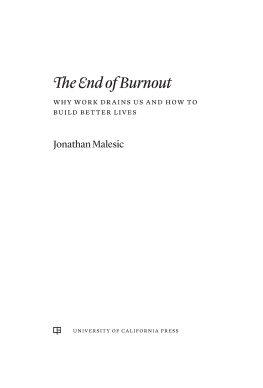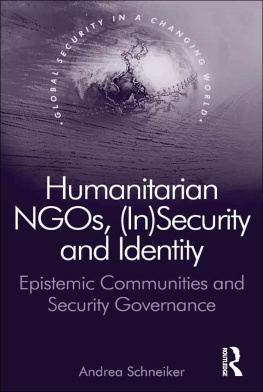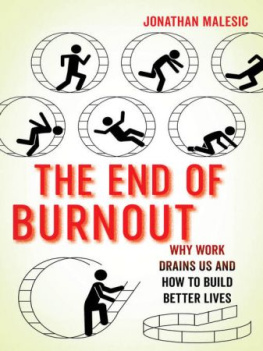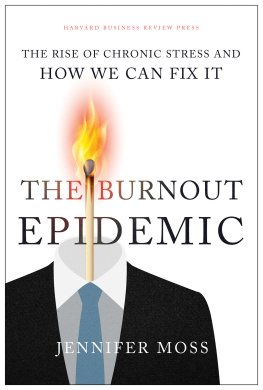The Vulnerable Humanitarian
The Vulnerable Humanitarian challenges the prevalence of stress and burnout culture within the aid sector, laying bare the issues of power, agency, security and wellbeing that continue to trouble organisations and staff.
Engaging and insightful, this book illustrates the problematic and unrealistic expectations of aid workers through the archetype of the perfect humanitarian, and considers why burnout is so endemic, yet so rarely acknowledged, within aid organisations. The book provides practical means through which staff and managers can reflect upon and discuss damaging organisational cultures and behaviours, and develop a more inclusive and caring work environment. Drawing on original academic research and interviews with national and international aid workers and development experts, the book proposes a feminist, anti-racist and decolonial agenda in challenging oppressive systems and structures within the sector. With extensive professional experience as an aid worker herself, Gemma Houldey also shares her own struggles with mental health and what she has learned from feminist practices for self- and collective care.
Proposing new ways of addressing wellbeing that are sensitive to the multi-faceted personalities and lived experiences of people working on aid and development programmes, The Vulnerable Humanitarian is essential reading both for current aid sector employees and for prospective employees and students.
Gemma Houldey, PhD, is an independent researcher, facilitator and advisor on staff care and culture change in the aid and development sector. For over 15 years she has worked on human rights and conflict programmes for international NGOs including Christian Aid and Amnesty International, and civil society groups in the Occupied Palestinian Territory, Uganda and Tanzania. Trained in several somatic and healing modalities, Gemma designs and delivers support programmes aimed at creating more compassionate and inclusive working cultures, weaving in appropriate practices for self- and collective care.
Routledge Humanitarian Studies Series
Series editors: Alex de Waal, Dorothea Hilhorst, Annette Jansen and Mihir Bhatt
Editorial Board: Dennis Dijkzeul, Wendy Fenton, Kirsten Johnson, Julia Streets and Peter Walker
The Routledge Humanitarian Studies series in collaboration with the International Humanitarian Studies Association (IHSA) takes a comprehensive approach to the growing field of expertise that is humanitarian studies. This field is concerned with humanitarian crises caused by natural disaster, conflict or political instability and deals with the study of how humanitarian crises evolve, how they affect people and their institutions and societies, and the responses they trigger.
We invite book proposals that address, amongst other topics, questions of aid delivery, institutional aspects of service provision, the dynamics of rebel wars, state building after war, the international architecture of peacekeeping, the ways in which ordinary people continue to make a living throughout crises, and the effect of crises on gender relations.
This interdisciplinary series draws on and is relevant to a range of disciplines, including development studies, international relations, international law, anthropology, peace and conflict studies, public health and migration studies.
Adolescents in Humanitarian Crisis
Displacement, Gender and Social Inequalities
Edited by Nicola Jones, Kate Pincock and Bassam Abu Hamad
The Humanitarian Machine
Reflections from Practice
Edited by Diego Fernandez Otegui and Daryl Yoder-Bontrager
The Vulnerable Humanitarian
Ending Burnout Culture in the Aid Sector
Gemma Houldey
For more information about this series, please visit: www.routledge.com/Routledge-Humanitarian-Studies/book-series/RHS
First published 2022
by Routledge
2 Park Square, Milton Park, Abingdon, Oxon OX14 4RN
and by Routledge
605 Third Avenue, New York, NY 10158
Routledge is an imprint of the Taylor & Francis Group, an informa business
2022 Gemma Houldey
The right of Gemma Houldey to be identified as author of this work has been asserted by her in accordance with sections 77 and 78 of the Copyright, Designs and Patents Act 1988.
All rights reserved. No part of this book may be reprinted or reproduced or utilised in any form or by any electronic, mechanical, or other means, now known or hereafter invented, including photocopying and recording, or in any information storage or retrieval system, without permission in writing from the publishers.
Trademark notice: Product or corporate names may be trademarks or registered trademarks, and are used only for identification and explanation without intent to infringe.
British Library Cataloguing-in-Publication Data
A catalogue record for this book is available from the British Library
Library of Congress Cataloging-in-Publication Data
Names: Houldey, Gemma, author.
Title: The vulnerable humanitarian : ending burnout culture in the aid sector / Gemma Houldey.
Description: Abingdon, Oxon ; New York, NY : Routledge, 2022. |
Series: Routledge humanitarian studies | Includes bibliographical references and index.
Identifiers: LCCN 2021012821 (print) | LCCN 2021012822 (ebook) | ISBN 9780367469801 (hbk) | ISBN 9780367469795 (pbk) | ISBN 9781003032427 (ebk)
Subjects: LCSH: Burn out (Psychology) | Well-being. | Job stress. | Humanitarian assistancePsychological aspects.
Classification: LCC BF481 .H65 2022 (print) | LCC BF481 (ebook) | DDC 158.7/23dc23
LC record available at https://lccn.loc.gov/2021012821
LC ebook record available at https://lccn.loc.gov/2021012822
ISBN: 978-0-367-46980-1 (hbk)
ISBN: 978-0-367-46979-5 (pbk)
ISBN: 978-1-003-03242-7 (ebk)
DOI: 10.4324/9781003032427
Typeset in Baskerville
by codeMantra
DOI: 10.4324/9781003032427-3
In June 2020, following protests around the globe against the killing in the US of George Floyd by a police officer who leaned against his neck with his knee for nearly nine minutes, suffocating Floyd, aid practitioners and organisations were forced into some critical self-reflection about racism within the sector. Whilst some INGOs offered statements committing to systemic change,1 perhaps the most hard-hitting response came from the newly formed Women of Colour Forum, part of the Gender and Development Network (GADN) comprised of UK NGOs and practitioners, and partners and organisations in the South, working on gender justice and equality. Part of the statement reads:
The international aid sector continues to be driven by a White-Saviour complex which prioritises and privileges the knowledge and experience of White people which in turn shapes job titles (such as experts and advisors held mostly by White people based in the Global North), pay structures, hiring practices and decision-making across organisations.
(GADN Women of Colour Forum, 2020)
The term white saviourism is not a new one within the aid sector; yet when it comes down to it people like myself can feel an urge to get defensive when we are accused of contributing to an organisational culture that reinforces, rather than challenges, inequality. Im a humanitarian after all surely Im not part of the problem? I may be white, but am I personally racist?

